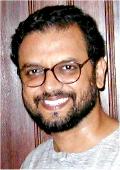The Independent Newsweekly
| National
Catholic Reporter
The Independent Newsweekly |
| Global Perspective |
| October 22, 2003 |
Vol.
1, No. 30
|

Fr. Francis Gonsalves is a Jesuit in the Gujarat Province, India. He lectures in systematic theology at Vidyajyoti College of Theology, Delhi, and has published many articles on theology, spirituality and social justice. |
Theology outside the templeBy Francis Gonsalves, S.J. CHENNAI, India -- Millions of bhaktas (believers) in India encounter God in temples. However, students of contextual theology at the Vidyajyoti College of Theology, Delhi, North India, and at the Department of Christian Studies, University of Madras, South India, discover divinity far from the temple precincts.
Context as crucial as content
Dazzling diversity being endemic to India, contexts vary. Thus, Vidyajyoti manages four regional theology centers (RTCs) at Patna, Ranchi, Kolkata, and Chennai, each providing students with a concrete context as substratum for theologizing. It is mandatory that staff and students be immersed in the struggles of people in bastis (slums), hospitals, jails and villages. Jesuit Anselm Kujur, Director of Fieldwork, stresses the centrality of anubhava (experience), since "contextual theology is a cyclical process of experience, analysis, reflection, action." Students find contextual theology rewarding. "The socio-economic, political and religious contexts challenge my faith," opines Salesian Sr. Margaret Devadoss, "necessitating an integrated commitment to transform myself and Indian society." Says Nishant Surya of the Indian Missionary Society, "Contextual theology helped me discover the Indian face of Jesus Christ." Perspectival privileging of the poor
At the undergraduate level, the RTCs at Chennai and Patna develop Dalit theology, while the Ranchi RTC deals with tribal theology. Joseph Thayil, Director of the Patna RTC, believes that "By doing theology from a Dalit perspective, students develop deeper interest to work for the marginalized, poor and Dalits, whatever be their future ministry." On the threshold of priesthood, Raj Kumar feels that theology helps him to "identify with the struggles of the poor. God has come closer to me than ever before. I hope to participate in the spiritual and liberative movements of people I'll serve." At the postgraduate and doctoral levels, the Department of Christian Studies, Madras, is a front-runner in researching subaltern themes. Salesian Jose Maliekal, who studied the impact of Catholicism on a Madiga (Dalit) community, says, "The dominant theological discourse, informed by the polarities of matter/spirit and transcendence/immanence, must evolve into a 'primordial theology' - that recognizes transcendence in the everyday subaltern struggles for identity, survival, and autonomy." Theology often recognizes the "Big Tradition" but overlooks "little traditions." "Feminist theology is largely confined to issues of the so-called high-caste women or the educated urban women," says Presentation Sr. Shalini Mulackal, who is researching the religious practices of rural Dalit Christian women. "I hope to show that their God-concepts and religious practices enable them to be active agents of their own liberation." No dialogue, no theology
"The cultural context of West Bengal," says George Pattery, Director of the Kolkata RTC, "blends the best of goddess Kali and Marx, Tagore and Subhas Bose (nationalist), the minstrel Bauls and the aboriginal Santals who harmonize in a rare mixture of revelation and faith." Likewise, Vidyajyoti's cross-cultural celebrations of Karam, Onam and Pongal become wellsprings for theologising, since people's songs and symbols, dances and dramas mirror that Mystery that every Indian soul savors. At the Department of Christian Studies, interfaith dialogues continue ceaselessly. Wilfred explains, "Our Department is part of a larger whole, namely, the School of Philosophy and Religious Thought, which embraces five sister departments: Philosophy, Vaisnavism, Saivism, Jainism, and Islamic Studies." A common program of comparative religion and philosophy facilitates learning about religions from "insiders" (professors-religionists) of other religions during theological education. In the dialogue with religions, the subaltern perspective is not compromised. Gnana Patrick recently published his doctoral thesis on a subaltern religious phenomenon termed Ayya Vali, while James Ponniah is researching a folk cult called Sudalaimadan. The Second Vatican Council's clarion call to dialogue with the "isms" impelled Indian theology to incorporate transdisciplinary approaches in its method. Wilfred points out that "Our researches rigorously follow the method of two or more disciplines which are harmonized." Consequently, theology draws insights from other disciplines and dynamically dialogues with academicians and ideologues committed to bettering India. Theology's tomorrow?
1. See Rabindranath Tagore's famous collection of poems, Gitanjali, no. 10. 2. Vatican Council II's Gaudium et Spes, no. 62, reads, "… In pastoral care, appropriate use must be made not only of theological principles, but also of the findings of the secular sciences, especially of psychology and sociology." |
| Copyright
© 2003 The National Catholic Reporter Publishing Company, 115
E. Armour Blvd., Kansas City, MO 64111
TEL: 1-816-531-0538 FAX: 1-816-968-2280 |